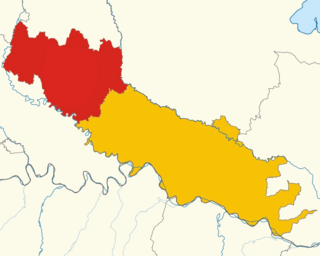| Cremish | |
|---|---|
| Cremasque | |
| cremàsch | |
| Native to | |
| Region | Cremasque Territory |
| Ethnicity | Cremasque |
| Language family | Indo-European |
| Early forms | Old Latin |
| Writing system | Latin |
| Language codes | |
| ISO 639-3 | – |
 Cities in which Cremish is spoken Cities in which Cremish is spoken | |
Cremish or Cremasque, (Cremish Lombard: cremàsch) is an Eastern Lombard dialect spoken in the Cremasque Territory of the Province of Cremona, where Cremonese is spoken in the rest of the land except for Soresina and the aforementioned land. The dialect is slowly dying, as younger people don't use it as much anymore.
Classification
Cremish is an Eastern Lombard dialect belonging to the Gallo-Italic branch of the Romance languages. It is more closely related to the Langues d'oïl, Occitan, Catalan, the Rhaeto-Romance languages, and the Iberian Romance languages, than Italian. It is similar to the dialects of Bergamo (Bergamasque) and Brescia (Brescian).
Distribution
The dialect is mostly spoken in the Cremasque Territory, which is the area adjacent to Crema and surroundings. It extends from the area of Rivolta d'Adda to Gombito and Castelleone.
Orthography
The dialect is traditionally written in the Classical Cremish Orthography, which is shown in Bonifacio Samarani's book Vocabulario cremasco-italiano.
Rules
The following are rules in the Classical Cremish Orthography.
- The vowels a, e, and i have an acute accent when they are long vowels.
- E and o are without accent when they are short and closed /e/ and /o/.
- È and ò make an open sound, short or long /ɛ/ and /ɔ/.
- É and ó are a longer closed sounds /eː/ and /oː/ respectably.
- Ö is the letter of /œ/, like the German können.
- Ü is the written form of /ʏ/ as in German flüsse.
Literature
The Cremish dialect began thriving in literature in the 18th century. A notable poet that wrote in the dialect was Federico Pesadori, who wrote works such as A Crèma, Ai casòt d'ingürie, and L'ucarina.
Bibliography
- Geroldi Luciano, Vocabolario del dialetto di Crema, Edizioni Tipolito Uggè, 2004
- Francesco Piantelli, Folclore Cremasco, ristampa, Arti Grafiche Cremasche, 1985, pag. 422 e seguenti.
- Bonifacio Samarani, Vocabolario cremasco-italiano, 1852
References
- Hammarström, Harald; Forkel, Robert; Haspelmath, Martin; Bank, Sebastian (2023-07-10). "Glottolog 4.8 - Piemontese-Lombard". Glottolog. Leipzig: Max Planck Institute for Evolutionary Anthropology. doi:10.5281/zenodo.7398962. Archived from the original on 2023-10-29. Retrieved 2023-10-29.
- Sanga, Glauco (1984). Dialettologia lombarda : lingue e culture popolari. Pavia: Aurora. p. 8. Retrieved 6 June 2022.
- Sport (2018-01-20). "Rinascimenti: aperitivo an dialèt cremàsch". Il Nuovo Torrazzo (in Italian). Retrieved 2024-05-10.
- Grande illustrazione del Lombardo-Veneto, ossia Storia delle citta, dei borghi, comuni, castelli, ecc. fino ai tempi moderni per cura di letterati italiani (in Italian). presso Corona e Caimi. 1859. p. 723.
- Piastrella, Carlo. Crema Nel Settecento (in Italian). p. 15.
- Rivista italiana di letteratura dialettale (in Italian). 1931.
External links
- Nature of Cremasque (with names of animals and plants in Cremish)
- Nicknames of the inhabitants of the villages of the cremasque Archived 5 March 2016 at the Wayback Machine (scormagna or scurmagna)
| Romance languages (classification) | |||||||||||||||||||||||||||
|---|---|---|---|---|---|---|---|---|---|---|---|---|---|---|---|---|---|---|---|---|---|---|---|---|---|---|---|
| Major branches | |||||||||||||||||||||||||||
| Eastern | |||||||||||||||||||||||||||
| Italo- Dalmatian |
| ||||||||||||||||||||||||||
| Western |
| ||||||||||||||||||||||||||
| Others | |||||||||||||||||||||||||||
| Reconstructed | |||||||||||||||||||||||||||
| |||||||||||||||||||||||||||
| Languages of Italy | ||||||||||||||||||||||||||||||||||||||||||||||||||
|---|---|---|---|---|---|---|---|---|---|---|---|---|---|---|---|---|---|---|---|---|---|---|---|---|---|---|---|---|---|---|---|---|---|---|---|---|---|---|---|---|---|---|---|---|---|---|---|---|---|---|
| Historical linguistic minorities: Albanian, Catalan, Croatian, French, Franco-Provençal, Friulian, Germanic, Greek, Ladin, Occitan, Romani, Sardinian, Slovene, Wenzhounese | ||||||||||||||||||||||||||||||||||||||||||||||||||
| ||||||||||||||||||||||||||||||||||||||||||||||||||
| ||||||||||||||||||||||||||||||||||||||||||||||||||